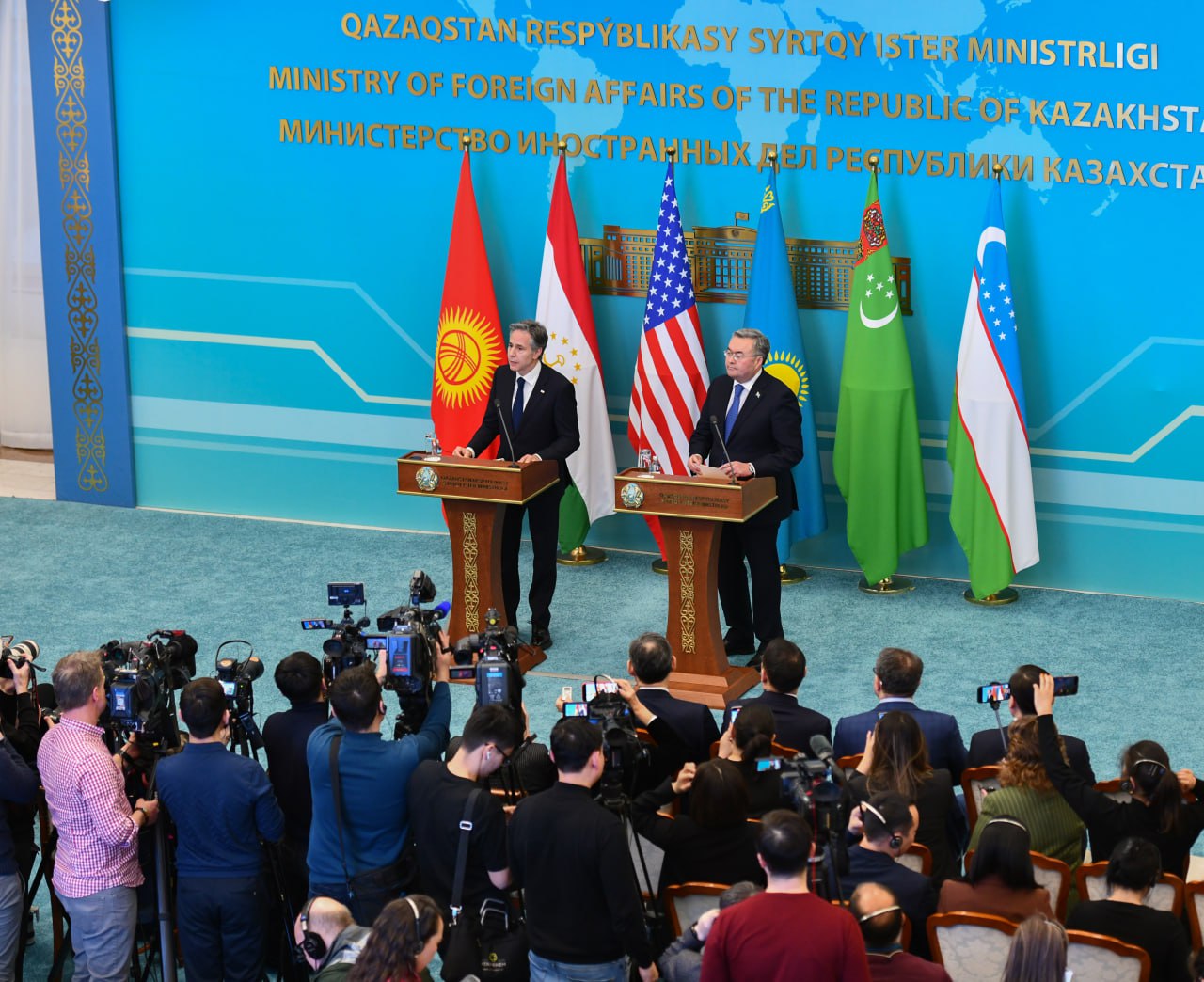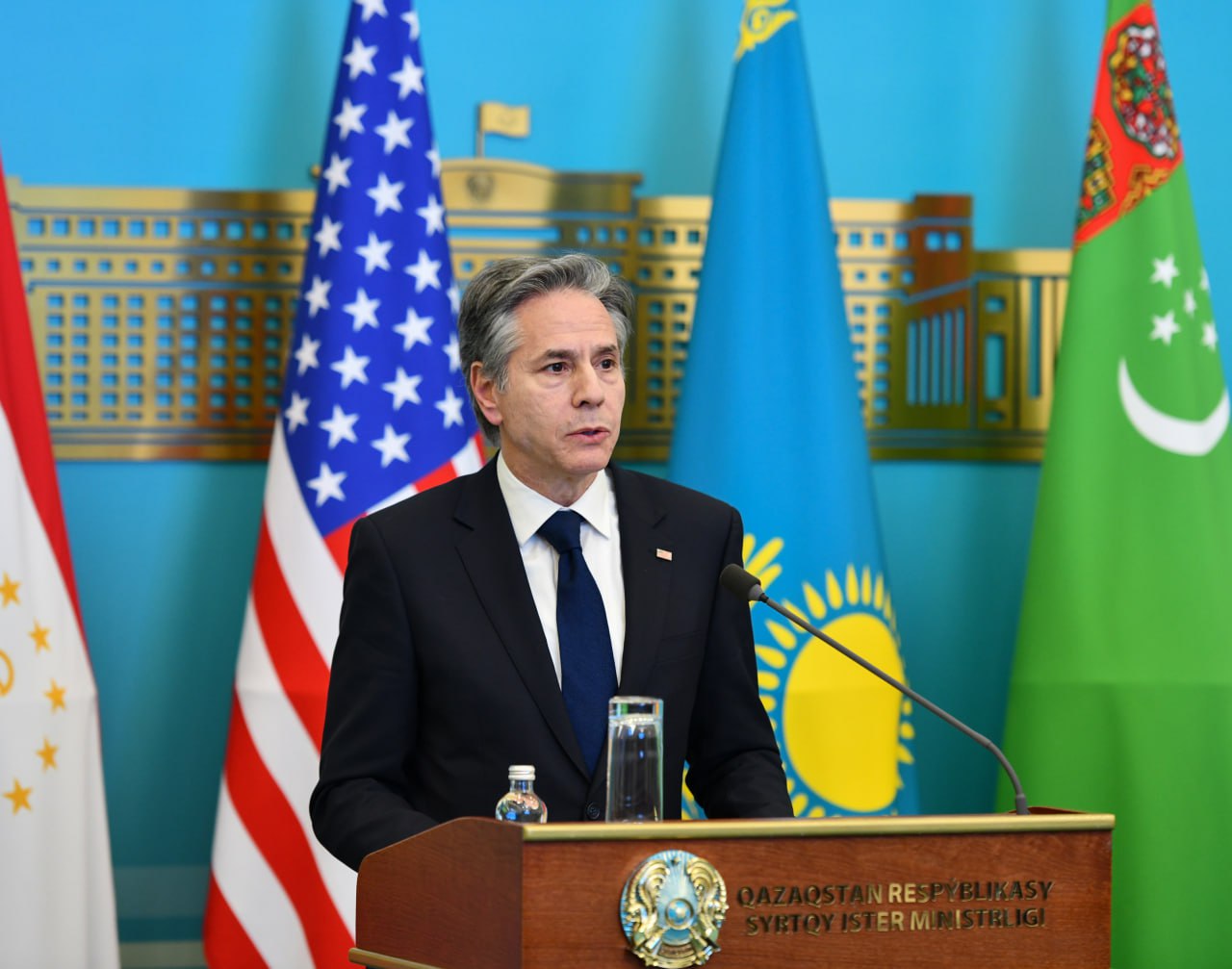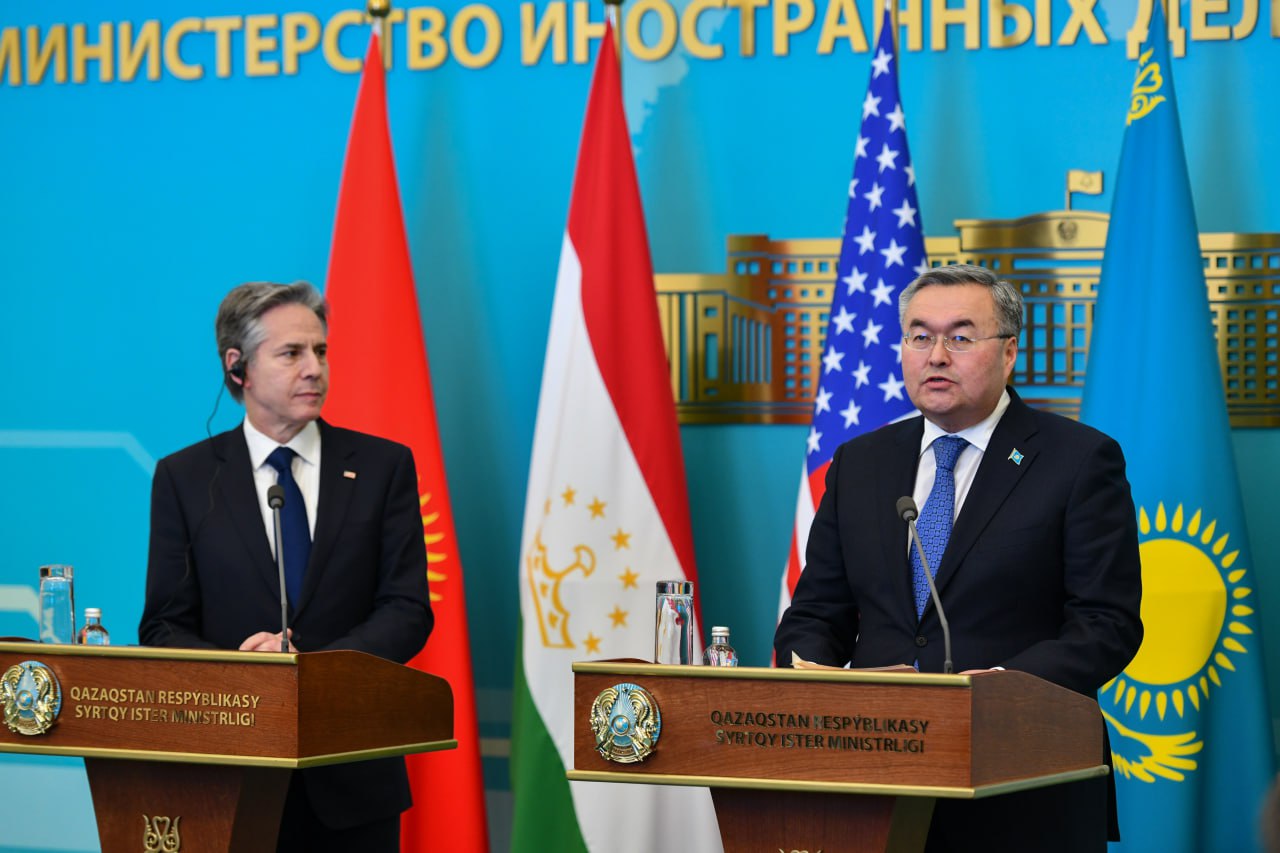ASTANA – The United States reaffirms its unwavering support for Kazakhstan to determine its future freely, and strongly endorses the reform agenda announced by President Kassym-Jomart Tokayev last March, U.S. Secretary Antony J. Blinken said during a Feb. 28 press briefing following his first official visit to Kazakhstan.

Foreign Minister Tileuberdi and U.S. Secretary Blinken during press briefing on Feb. 28. Photo credit: MFA press service.
Blinken asserted the U.S. looks forward to seeing the additional concrete steps Kazakhstan will take to realize new reforms, adding that these reforms are an important reason why foreign investors, including Americans, are turning to Kazakhstan. He noted that American businesses were among the first to invest in the Kazakh economy, injecting more than $50 billion since 1991.
The U.S.- Kazakh bilateral trade turnover exceeded $3 billion in 2022, up 37.2 percent from the previous year, according to the Kazakh statistics. The total inflow of foreign direct investments from the U.S. to Kazakhstan exceeded $62 billion, with the volume of American investments increasing by 58.8 percent in the first three quarters of 2022 compared to the same period in 2021.

Secretary Blinken said the US is doing everything possible to mitigate spillover consequences from the Russian sanctions on the economies of Central Asia at a Feb. 28 press briefing. Photo: MFA press service.
“We are eager to bolster our economic cooperation, not only to strengthen the development and opportunity within Kazakhstan but also to strengthen linkages across Central Asia, promoting the diversification of energy and export, among other investments that will benefit Kazakhstan’s people in very tangible ways,” Blinken said.
Kazakh Deputy Prime Minister and Foreign Minister Mukhtar Tileuberdi stressed that cooperation with the U.S. is developing in the spirit of an enhanced strategic partnership, as demonstrated by the revival of political dialogue, as well as trade, economic, and investment cooperation.
The sides also addressed the economic spillover effect of the sanctions imposed on Russia, which affected the economies of Central Asia, particularly Kazakhstan. Blinken stated the U.S. is conscious of the spillover consequences and is doing everything possible to mitigate them and create new opportunities for partners in Central Asia.
“We set up the Economic Resilience Initiative for Central Asia – $25 million to expand regional trade routes, establish new export markets, attract and leverage greater private sector investment, providing people with practical skills for the modern job market. Today, I’m announcing an additional $25 million for that initiative, a total of $50 million to build up the regional economy,” Blinken said.
Tileuberdi added the government of Kazakhstan and the U.S. leadership established the mechanism of regular consultations to avoid the negative consequences for the Kazakh economy and prevent possible secondary sanctions.

Kazakhstan would continue developing a mutually beneficial relationship with countries worldwide, said Foreign Minister Tileuberdi at a Feb. 28 press briefing. Photo: MFA press service.
“We have national coordinators appointed on both sides, and they are in touch with each other. We are really thankful to the American side for informing us about possible cases of the imposition of secondary sanctions as early as possible. Therefore, I would like to say that for the time being, not a single Kazakh company or a single Kazakh sector has been affected by secondary sanctions,” Tileuberdi said.
Blinken also applauded Kazakhstan’s humanitarian efforts amid the Russian-Ukrainian conflict by hosting more than 200,000 Russian citizens who fled their country, and by generously providing food, clothing, medicine, and other humanitarian supplies to Ukraine, including setting up ‘yurts of invincibility’ in Kyiv and Bucha.
Blinken also addressed the security of Kazakhstan amid rising concerns after the Russian-Ukrainian conflict. He said the U.S. support for independence and territorial integrity “is manifested in helping them [Central Asian states] to develop the strongest possible capacities for their security, their growing economic prosperity, and the strength and resilience of their societies.”
In turn, Tileuberdi stated that while Kazakhstan does not permit using its territory to circumvent sanctions, the country “does not feel any threats or risks from the Russian Federation.”
“We have a solid legal base for bilateral cooperation and relationship. We have completed the delimitation process, the state border between Kazakhstan and Russia, which is very important. As you know, it is the longest land border in the world – more than 7,500 kilometers. Now we are in the process of demarcation. Almost 70 percent of this border [demarcation] is completed,” he said.
Tileuberdi added Kazakhstan would continue its multi-vector foreign policy, keeping the system of checks and balances and developing solid ties with countries worldwide.
In conclusion, Blinken said it is symbolic that Kazakhstan is a launching point in the “journey for the stars” for seven astronauts from different countries currently orbiting the International Space Station.
“They speak different languages, but many of these astronauts journeyed to the stars together from Kazakhstan, and they will land here in Kazakhstan when they return to Earth. To me, that is a wonderful symbol of how this country can be a launching pad for our collective progress on earth through the partnership between the United States and Kazakhstan, across Central Asia, and around the globe,” he concluded.
